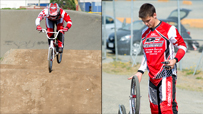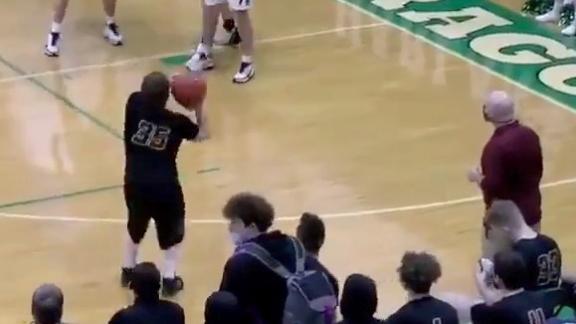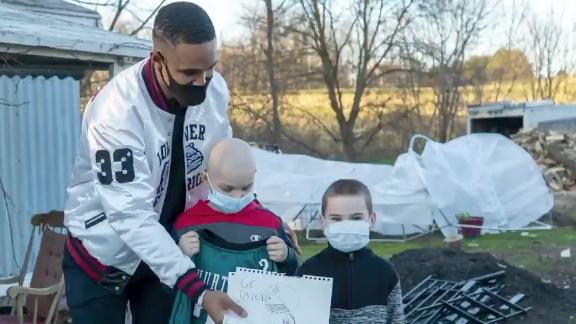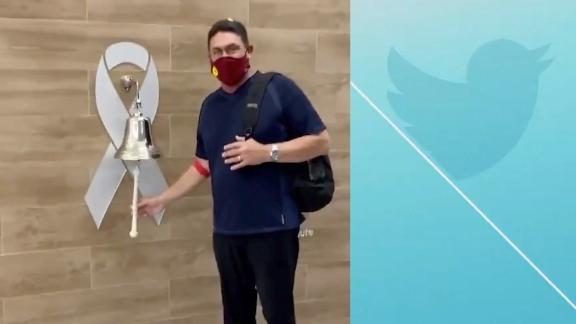In mid-May, at the UCI Supercross race in Papendal, Netherlands, Canada's Tory Nyhaug went down, hard. The results of Nyhaug's fall, mere months before the biggest race of his life at the Olympic Games in London, was a ruptured spleen (his second to date.) Nyhaug remained in intensive care in the Netherlands for 11 days before flying home to Canada and facing what could possibly become a life-changing decision -- lose the spleen and race the Olympics, possibly affecting his health for the remainder of his life, or keep his spleen, stay off the bike for six months while it heals, and miss the Olympics.
Ultimately, the 20-year-old from Coquitlam, British Columbia, discussed the decision with his doctor. His spleen would heal organically from the rupture in six months, but there would always remain a chance of the organ re-rupturing, in addition to missing the race. Nyhaug opted for surgery, and a rigorous five-year vaccination plan for the remainder of his life to avoid infection.
On June 3, a little more than two months before the start of the Olympic Games in London, Tory Nyhaug underwent a splenectomy, followed by a month of bed rest. Miraculously, a month later, he went back to training, and will represent Team Canada in August as its sole BMX rider in the Olympic Games in London. Recently, we sat down with Tory to discuss the injury, his recovery and his thoughts heading into London.
ESPN.com: You had a pretty rough crash. How has your recovery been going?
Nyhaug: The first month was extremely hard. Physically I was in constant pain and mentally, it was hard because we were in the unknown. All we knew was that my spleen was in bad shape, really bad. Especially in Holland, we didn't know whether I was going to keep my spleen or have it removed or if we were going to even keep our Olympic spot. Once I got home from Holland, it was the doctor's decision that for the rest of my career and life, it was safest to have it removed. The surgery went great, they were able to do a non-invasive procedure, so little damage was done. The first few weeks of rehab went extremely well, and I improved a lot everyday. Now I'm in a full training program and feeling confident.
Are you back to 100 percent yet?
It's been a process and will continue to be a process. I'm healthy and feeling fast and confident on the supercross hill and big jumps. We are going to do everything we can in training to make sure that I'm ready to go on the day.
Being from such a rainy province in Canada might seem a disadvantage in the BMX race scene. How have you managed to power through and become one of the guys to watch out for?
It's definitely hard sometimes, especially with the bad weather in the fall and winter months. But our BMX community is so tight and supportive that I am truly proud and happy to be Canadian and represent my country. I love living here and it is kind of nice to be away from all the hype in other places sometimes. I can just put my head down and get to work at home -- it's a great place to train. I've raced in the States since I was young because that's where the best competition in the world is. It's made me a better rider, especially when I was going through the amateur ranks.
Is BMX racing in Canada much different than in the States?
It's definitely a lot smaller than in the states. The BMX population in the states is huge. We have world class riders in Canada also but just not the same amount. The competition in the states is better than anywhere and I think anyone in the world that wants to improve themselves needs to go race in the states. It's what I did as a young kid and I'm so glad I did because I learned a lot and improved at a much higher rate than I think I would've if I had just raced at home. But, BMX is BMX no matter where you go in the world.
Do you think there will be any difference heading into the Olympics versus heading into a normal Supercross race?
It will definitely be bigger and more exciting, no question. It's the highest level of any sport and it's so cool that BMX is a part of it. But you can't let the situation overtake you -- you just have stay calm, stick to the plan and treat it like any other race. The guys that do that will be the most successful.
At what point did you realize your goal of being an Olympian this year was a real possibility?
Honestly, it was when I woke up from surgery and felt my stomach. I realized I had small wounds and the nurse said the procedure went great. That's the point where in my head, a lightbulb clicked on. I realized that 'Yeah, right now I'm in hell, but I will get healthy, I will get better everyday and I will be on the gate in London!'

When I woke up from surgery, the nurse said the procedure went great. That's the point where a lightbulb clicked on in my head.

--Tory Nyhaug
What was that boost of motivation like?
It was huge and just what I needed at that time. There was so much up in the air about what was going to happen in the first few weeks. Deep down, I knew I was going to be in top form and be ready to go in London -- I really didn't care that the doctors said I wouldn't be ready. I would just smile to myself and think 'You just wait and see, I'll be there.'
Are you doing any special prep leading into the Games?
Nothing special, just putting my head down with my coaches and trainers behind me. It's easy to be positive and motivated with such great people supporting me. I wouldn't be where I am now without the effort of CCA, B2Ten and OTP supporting me. I had my physio/strength coach Damien Moroney with me everyday in the initial three weeks back and he got me in great shape. Now it's me and my coach, and Adam Muys working together everyday to be in top form on the day.
Do you feel any extra pressure being one of the under dogs heading in?
No I don't feel any extra pressure going in. Of course every top athlete puts pressure on themselves to be the best they can be because we are all perfectionists. We all have our own expectations, but I have such amazing support from the people around me that I'm feeling confident and relaxed going in. I've gone through so much in the last couple months that I'm just so happy and relieved that I still have the opportunity to go and do my best!
How do you think being an Olympian will affect your career as a BMX racer?
I think it will no doubt be the coolest thing in my career. It's the highest level in any sport, and I think I'll learn a lot about myself at the Olympics and it will be an experience I will never forget.
Anyone you'd like to thank?
First off, I'd like to thank my family, friends and girlfriend for their amazing support through this whole process and without B2ten, OTP, CCA -- I wouldn't be where I am at in my preparation. I would also like to thank Damien, Paulo, PH, and Adam for dedicating themselves to my full recovery and training program! Thanks!





